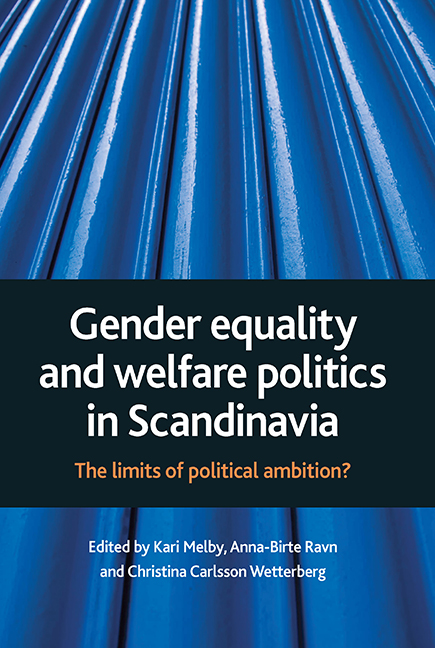Book contents
- Frontmatter
- Contents
- List of tables
- Preface
- Notes on contributors
- A Nordic model of gender equality? Introduction
- Part One Meanings of gender equality in Scandinavian welfare policy
- Part Two Current challenges: competing discourses on gender equality
- Postscript Gender, citizenship and social justice in the Nordic welfare states: a view from the outside
- Postscript Future research on gender equality in the Scandinavian countries
- Appendix Tables 1-10
- Index
Postscript Gender, citizenship and social justice in the Nordic welfare states: a view from the outside
Published online by Cambridge University Press: 21 January 2022
- Frontmatter
- Contents
- List of tables
- Preface
- Notes on contributors
- A Nordic model of gender equality? Introduction
- Part One Meanings of gender equality in Scandinavian welfare policy
- Part Two Current challenges: competing discourses on gender equality
- Postscript Gender, citizenship and social justice in the Nordic welfare states: a view from the outside
- Postscript Future research on gender equality in the Scandinavian countries
- Appendix Tables 1-10
- Index
Summary
This postscript offers an outsider's assessment of the political ambition represented by the Nordic welfare-state model from a gender perspective. More than any other welfare-state model, the Nordic or social-democratic model is not just a label applied by welfare-regime analysts but is worn with pride by Scandinavian governments and citizens. As this volume demonstrates, gender equality is treated as a hallmark of this model (even if there are differences between the Nordic countries). The original class-based ‘passion for equality’ was gradually extended explicitly to embrace gender so that, according to Arnlaug Leira, gender equality is now ‘integral to Scandinavian citizenship’ (Ellingsæter and Leira, 2006, p 7). This shapes the gender culture within which specific policies operate in the Nordic welfare states.
Nevertheless, as this volume again demonstrates, there are considerable differences between the Nordic countries. In particular, while the Nordic welfare states tend broadly to be characterised as among those that have moved furthest towards a dual earner or adult worker model, the policy mechanisms deployed to support those with care responsibilities differ in terms both of the specifics of policy and of the gendered citizenship models underlying them.
Just as there are differences between policies for gendered citizenship between the Nordic countries, so there are differences among feminist scholars in their evaluation of the Nordic model. Such differences can reflect differing normative positions as to whether the goal is an ostensibly gender-neutral or an explicitly gender-differentiated model of citizenship or some combination of the two (Lister, 1997/2003). Nordic policy discourses have generally been gender neutral, with the explicit aim of promoting equality between women and men. However, some policies, even though still couched in gender-neutral language, arguably are more consistent with gender-differentiated models of citizenship, in which women's particular responsibilities and needs are recognised.
Distinctive too, among some Nordic welfare states, has been the attempt, however tentative, to promote a more gender-inclusive model of citizenship in which men as well as women are able to play a part as citizen-earner/carers and carer/earners. This points towards what Nancy Fraser (1997) has termed the universal-caregiver model in which men become more like women, rather than the universal-breadwinner model in which women are expected to become more like men. Nowhere, needless to say, has achieved the universal-caregiver model.
- Type
- Chapter
- Information
- Gender Equality and Welfare Politics in ScandinaviaThe Limits of Political Ambition?, pp. 215 - 222Publisher: Bristol University PressPrint publication year: 2008
- 1
- Cited by



